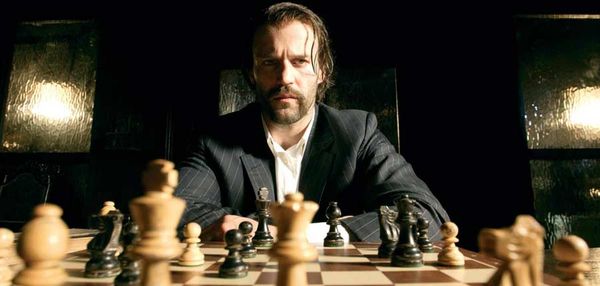Eye For Film >> Movies >> Revolver (2005) Film Review

Like the main characters of his most recent film Revolver, it seems that Guy Ritchie is destined to be his own worst enemy.
He exploded onto the scene with the low-budget Lock, Stock and Two Smoking Barrels, a film whose manically intertwining plotlines, quirkily laddish ensemble, arresting visual style and all-round good humour made it, at least when it was first released in 1998, a genuinely refreshing and vibrant piece of British filmmaking.

Not unlike Quentin Tarantino on the other side of the Atlantic, Ritchie was first lionised by the press and then held unfairly responsible for the subsequent slew of inferior rip-offs by other directors. Ritchie tried to reclaim his ownership of the multi-stranded gangster movie with Snatch (2000) - essentially a bigger, brassier retread of Lock, Stock - only to find himself branded a one-trick pony.
After a failed attempt to break away from his roots with the romantic comedy Swept Away (2002), Ritchie has now returned once again to the genre that made (and then destroyed) his name, but this time, instead of going over the same old ground, he has tried something new. While on the surface Revolver features all the scams, crimes, guns and stylised exuberance that we have come to expect from Ritchie, it is also a head-scratching existential mystery, concerned, not only with long-cons and shoot-outs, but also with conjuring ludic symbologies and allegorising the tripartite nature of the soul.
Fresh out on the streets after serving a seven-year prison sentence, claustrophobic grifter Jake Green (Jason Statham) is amassing a small fortune. His weapon is a semi-magical formula for the perfect con, a formula that he stole from two prisoners who had been his immediate neighbours in solitary confinement, and his aim is to take vengeance on Macha (Ray Liotta), the ruthless ganglord, whom he believes put him inside in the first place.
Keen to protect his own interests, Macha sends a hit squad, but Jake is rescued by a pair of chess-playing loan sharks, named Zack (Vincent Pastore) and Avi (Andre Benjamin), who offer to protect him from both Macha's killers and a terminal disease, on condition that he hand over all his money and do everything that they say.
Over the next few days, as the trio slyly engineer a war between Macha and his equally vicious Chinese rival, Lord Jon (Tom Wu), Jake must question his every value, until finally, alone in the confines of an elevator, he undergoes an epiphany that reveals who the true enemy is - something Macha will never grasp.
Any viewer expecting another Lock Stock caper is bound to be left bewildered, frustrated and bitterly disappointed by the mystical obliquities of Revolver. So it was with the majority of critics, who proved just as quick to excoriate Ritchie for doing something different as they had earlier condemned him for always doing the same. And Ritchie has not made things easy for his fans with this challenging enigma of a film that raises far more questions that it ever answers.
The unseen, but much feared, kingpin Sam Gold is set up as a Keyser Soze figure, but unlike in The Usual Suspects, his true identity is never clearly established; similarly Zack and Avi remain mysterious, as does the precise nature of their reality-altering business. Do any of these characters exist outside of Jake's mind, or are they just figments of his own psyche in crisis (as in David Fincher's Fight Club, or Adrian Lyne's Jacob's Ladder)? Has Jake really left his prison cell, or is he still there, anxiously fantasising revenge in solipsistic isolation (as in John Boorman's Point Blank)? Who exactly is the victim of the con, and who its victor? Ritchie may hint at a solution (or indeed at several), but ultimately he leaves it to viewers to puzzle their own way through his film's chessboard plotting and over-coded imagery.
Like Larry Bishop's Trigger Happy, Revolver takes a familiar criminal underworld and transforms it into an alien arena of fantasy and philosophy, where characters are taken to the outer limits of themselves and their genre. Ritchie may still be working within his beloved cockney gangster milieu, but he does to it something akin to what Alejandro Jodorowsky did to the Western with El Topo, or to the slasher flick with Santa Sangre.
In short, Revolver is a strange trip that dazzles the eye and exercises the brain, amply rewarding multiple viewings and certainly worthy of critical reevaluation. It is probably Ritchie's boldest and most interesting film to date, even if it is also pretentious enough to give his detractors yet another rope to hang him by.
Reviewed on: 19 May 2006



















